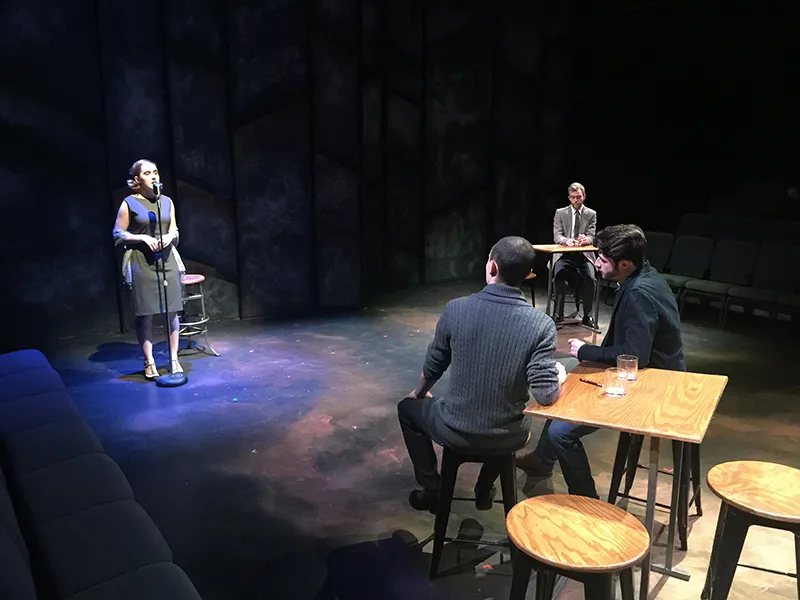
The stage lights are low as Machinal, the Department of Theatre and Dance’s most recent production, begins. Only the face of a young woman—the Young Woman—can be seen among a crowd of actors, her panicked breath audible over the drumming of a train in the background. She dashes offstage, fighting past motionless and apathetic bodies. The lights go out, and then quickly come on once again as a new scene opens. Amid the cacophonous whir of machines from speakers and devices on stage, ocean waves of monologues begin crashing and falling into each other as the cast members onstage simultaneously speak.
Situating a critique of gender politics within the industrial era, Sophie Treadwell’s Machinal, an Expressionist drama inspired by the trial of convicted murderer Ruth Snyder, captures the life of the “Young Woman”—named Helen Jones—in episodic vignettes. Beginning with her life as a young, somewhat fragile stenographer and ending with her disturbing death by electric chair, professor Ryder Thornton’s production of this 1928 play balances the real with the surreal of past and present to weave Treadwell’s complex narrative.
Like the real-life Snyder, the protagonist is trapped in an unhappy, manipulative marriage. She becomes intimately involved with an extramarital lover, who is somewhat participatory in the murder of her husband. Where Treadwell’s story deviates from Synder’s, however, is in her treatment of the central figure. Jones is characterized as a victim of circumstance; a sensitive figure suffocated by societal pressures and expectations of women in the early-20th century. She finds momentary, albeit problematic, liberation in murdering her husband. Zelda Kimble (SLA '20), the actress playing Jones in this production at Tulane, further highlights Jones’ humanity by creating a sympathetic character unquestioningly suffering at the hands of her over-bearing mother and controlling husband. In Kimble’s portrayal, the “Young Woman” is victimized by the rough, uncaring outer world of the play.
Though the majority of the production was costumed in clothing reminiscent of the 1920s and the dialogue retained the decade’s “roaring 20s” style, the incorporation of modern devices, such as earphones and electronic cigarettes, reminds the audience that many of the issues touched on in the play continue to plague women today. Indeed, I shuddered in familiarity to every reference to a lack of female autonomy, one-note jokes about feminine stereotypes, and thinly veiled threats to submit to the authority of the male figures.
The use of silhouette, confined to a specific part of the stage, is a prominent tool throughout the production. Silhouettes incorporate elements of surrealism into the piece, nodding to Treadwell’s Expressionism, whilst reflecting, once again, themes of social isolation and loss of humanity. The silhouettes of the ensemble dancing, singing, or playing music are just that: silhouettes. Instead of fully-realized, fully-visible human beings, the dark figures were faceless, two dimensional substitutes.
Overall, Thornton’s production of Machinal was an effective marriage of past and present. Full of complex social commentary, Machinal demands a thoughtful, cohesive narrative construction that allows the audience to consider difficult, but relevant, sociological issues regarding gender, class, and individualism within a theatrical lens.
The Tulane University Department of Theatre and Dance produces approximately five shows a year and aims to showcase student talent by helping performers explore different styles of theatre. Machinal ran April 9-14, 2019 at Tulane’s Lupin Theatre. For more information about the department and its upcoming productions, visit liberalarts.tulane.edu/theatre-dance.

Drew Pearson (SLA '19) is a graduating senior from Chicago in the School of Liberal Arts, set to receive dual degrees in linguistics (B.S.), history (B.A.), and theatre performance (B.A.). She has performed in several Tulane productions including Julius Caesar (Cinna the conspirator), On the Verge (Alex), My Cup Ranneth Over (Paula), The Bald Soprano (Mrs. Smith), Green Table (Rook), and Frankenstein (Mary Shelley). This summer, she will be performing in New Orleans Shakespeare Festival’s production of Hamlet as Guildenstern.

